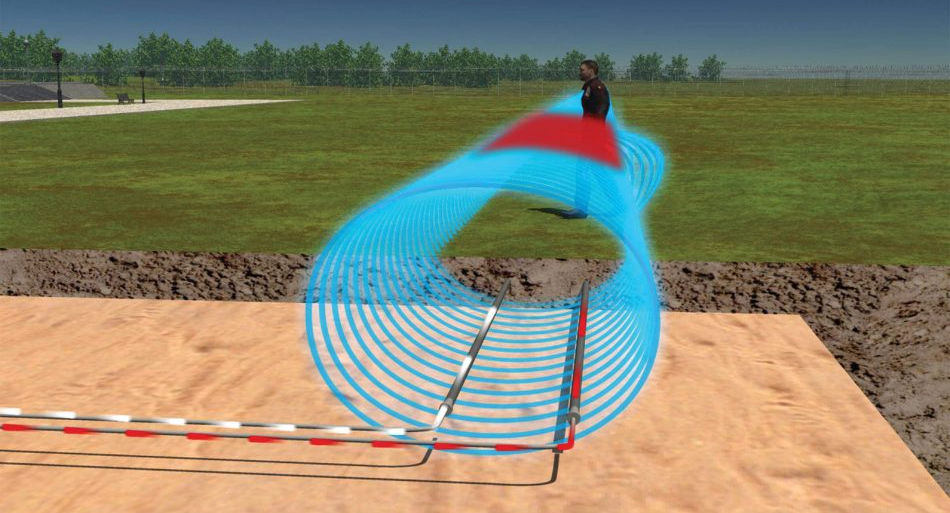
Perimeter Intrusion Detecion Solotions Africa
Perimeter Intrusion Detecion Solotions Africa
Perimeter Intrusion Detecion Solotions Africa
Perimeter Intrusion Detecion Solotions Africa
PIDSA (Pty) Ltd


.jpg)

OmniTrax
Locating Buried Cable Intrusion Detection Sensor
OmniTrax is a covert outdoor perimeter intrusion detection sensor. Buried sensor cables generate an invisible detection field that the system monitors to detect and locate intrusions. Being invisible, OmniTrax offers the lowest vulnerability to defeat (Vd) of any outdoor perimeter intrusion detection sensor while ensuring site aesthetics are maintained.
How It Works
OmniTrax uses ported (“leaky”) coaxial sensor cables to create an invisible electromagnetic detection field. Apertures within the cables enable energy from the transmit cable to be detected by the corresponding parallel receive cable. A patented coded pulse signal algorithm determines the exact intrusion location, including those occurring simultaneously.


Detection Capabilities
-
Detects and locates perimeter intrusions over a distance of up to 800 m (1/2 mi) per sensor processor
-
Pinpoints intrusions to ±1 m (3.3 ft)
-
Volumetric detection field is typically 1 m (3.28 ft) high and 3 m (9.84 ft) wide
-
Completely covert—site aesthetics left unchanged
-
Lowest Vulnerability to defeat (Vd) of any outdoor perimeter intrusion detection sensor

Robust Technology
-
Operation not affected by vegetation (including grass, shrubs and trees)
-
Insensitive to wind, rain, snow, hail, sandstorms, fog, extreme temperatures, seismic vibration, acoustics, magnetic effects and blowing debris
-
Can be calibrated to reject animal detection

-
Detection is based on the intruder’s electrical conductivity, size and speed.
-
Detection for an upright 35 kg (77 lbs) intruder, penetrating through the detection field is greater than 99%, with a 95% confidence.
-
Objects < 10 kg (22 lbs) are rejected with a statistical confidence level of 95%.
OmniTrax Features
Covert, Invisible security
The covert nature of OmniTrax provides the highest level of security while maintaining the existing appearance of the site. OmniTrax enables organizations to implement high security measures while still meeting the aesthetic and historical preservation requirements often required at country estates, historical government-owned buildings, low-security correctional centers, and open campuses.
Flexible Zoning
The sensor supports up to 50 distinct, software-defined detection zones. Zones enable a single sensor cable to be used across areas with different operational requirements (e.g. high-traffic areas like entrances) and to provide location data for integration with video surveillance and other security devices.
Reduce Infrastructure Costs
The sensor cables can carry both power and data, which greatly reduces infrastructure requirements. Power and communications are bi-directional and provide full redundancy in the event of a cable cut.
Networking and Integration
With on-board relay outputs, auxiliary inputs, and support for RS-422 and fiber optic communication cards, OmniTrax can work with virtually any security system.
Uniform detection in Different Media
Sensor cables can be direct-buried in a variety of mediums, including most soil types, asphalt and concrete. The graded cable design ensures a uniform sensitivity along the entire length of the cable while the detection settings can be calibrated on a per-meter basis.
Common Platform
OmniTrax uses the same configuration and integration software as other Senstar products, reducing training requirements while increasing operational efficiencies. The device is configured and calibrated with easy-to-use Windows®-based software over a USB or network connection. Alarms, control, and status information is managed by the Network Manager software, which provides a common unified interface for Senstar’s video and security management software as well as other industry-leading third-party systems
.
Deployment Diagram
OmniTrax typically communicates with the security system via RS-422 or fiber optic interfaces. The communications network may be shared with other Senstar sensors to reduce infrastructure requirements. Integrations using output relays are also supported.






